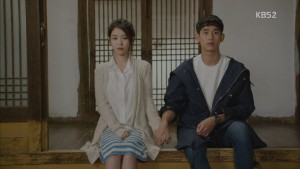 The Producers is one of the few series I wish would have a second season (and there are rumors that there will be). After such a successful ending, it’s easy to forget that the series did not start out so well. But the creators saved the show just like the PDs saved the day. They found a balance between comedic timing, character development, and drama. What’s more, the series did this all while giving some social commentary about celebrities, fans, and the entertainment industry.
The Producers is one of the few series I wish would have a second season (and there are rumors that there will be). After such a successful ending, it’s easy to forget that the series did not start out so well. But the creators saved the show just like the PDs saved the day. They found a balance between comedic timing, character development, and drama. What’s more, the series did this all while giving some social commentary about celebrities, fans, and the entertainment industry.
One of the most interesting things was when different characters faced the same struggles but learned different lessons. For example, Cindy (IU, Dream High) and Joon-mo (Cha Tae-hyun, My Sassy Girl, Speedy Scandal) both felt threatened by newcomers in their careers and romantic lives. For Cindy, her younger rival Ji-ni is shamelessly called “Cindy 2.” Joon-mo is on the verge of having his time slot being taken by Star Wars. At the same time, both are facing romantic rivals. Cindy falls for Seung-chan (Kim Soo-hyun, My Love From Another Star) because of his sincerity and kindness, but struggles to break through his love for Ye-jin (Gong Hyo-jin, It’s OK, That’s Love). Likewise, Joon-mo finds himself getting jealous of Seung-chan’s growing relationship with Ye-jin.
 Having rivals forces, the two have to do some serious soul searching. For Cindy, this means discovering her true self and learning her own self-worth. Growing up as a child star she learned how to put on an act to get what she wanted, isolating herself in the process. But she faces her own demons in the series and grows at a natural pace. She meets with her anti-fans face to face to try to figure out why they don’t like her. In her disastrous friendship episode with Go Ara, she learns that she’s not alone in feeling lonely; every star is pitted against each other, leaving little room for real friendship. With Seung-chan, Joon-mo, and Ye-jin she experiences real friendship and concern for the first time. Seung-chan, for example, gets revenge for Cindy by taking Ji-ni to the comedy room to get ready. Joon-mo lets Cindy stay at his house and hide. And of course it’s Ye-jin who clears her name by finding her old interview. At the end of the series, Cindy still has some emotional work to do, but she’s well on her way to happiness.
Having rivals forces, the two have to do some serious soul searching. For Cindy, this means discovering her true self and learning her own self-worth. Growing up as a child star she learned how to put on an act to get what she wanted, isolating herself in the process. But she faces her own demons in the series and grows at a natural pace. She meets with her anti-fans face to face to try to figure out why they don’t like her. In her disastrous friendship episode with Go Ara, she learns that she’s not alone in feeling lonely; every star is pitted against each other, leaving little room for real friendship. With Seung-chan, Joon-mo, and Ye-jin she experiences real friendship and concern for the first time. Seung-chan, for example, gets revenge for Cindy by taking Ji-ni to the comedy room to get ready. Joon-mo lets Cindy stay at his house and hide. And of course it’s Ye-jin who clears her name by finding her old interview. At the end of the series, Cindy still has some emotional work to do, but she’s well on her way to happiness.
For Joon-mo, the appearance of rivals forces him to think about his future as a PD and his relationship with Ye-jin. Despite his show’s declining ratings, he protects his writers from getting fired. Cindy’s scandal could ruin his show for good, and he doesn’t want to be the PD to end One Night, Two Days. But talking with Seung-chan reminds him of what is most important. He chooses to do the thing that is 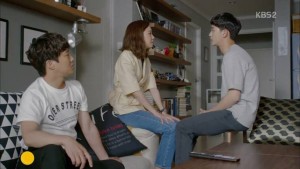 right rather than what is easy and keeps Cindy in the show despite strong objections. As for Ye-jin, Seung-chan’s arrival and her impending departure make him reconsider his true feelings. Their conversation about marriage and Ye-jin’s fondness for Seung-chan bothers him in ways he didn’t expect. He finally realizes that he followed her into producing not out of habit, but out of love.
right rather than what is easy and keeps Cindy in the show despite strong objections. As for Ye-jin, Seung-chan’s arrival and her impending departure make him reconsider his true feelings. Their conversation about marriage and Ye-jin’s fondness for Seung-chan bothers him in ways he didn’t expect. He finally realizes that he followed her into producing not out of habit, but out of love.
Besides the parallels between characters, what impressed me most was the treatment of female characters. There were so many who got their own storylines, and each was groundbreaking in her own way. The rookie Music Bank writer, Da-jung (Sun-a, Reply 1997), doesn’t have a lot of lines, but makes her presence felt. She’s unapologetic for seeing her beauty as an advantage. The men ogle her body shamelessly during the athletic competition, bring her gifts, and do chores for her. But instead of Da-jung coming off as manipulative or cruel, we see that it’s the men who are pathetic for dehumanizing and sexualizing her. She dresses how she likes, and she’s not responsible for men’s inability to be professional. Later on, Ye-jin is taken aback by how coolly Da-jung admits to having a lot of dating experience. In a drama culture where most young female characters have no dating history to show how “pure” they are, Da-jung was a nice change.
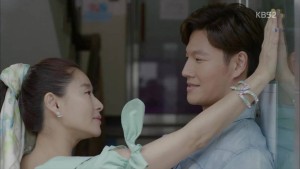 Cindy was not your typical young female character either. She’s completely upfront with Seung-chan about her feelings and even takes the bold step of kissing him first. There’s nothing wrong with being shy, of course, but it becomes a problem when being shy and passive is the only “right” way for a girl to be. It’s the reason why the notorious supply woman Yang-mi (Ye Ji-won, Naeil’s Cantabile) is also a memorable character. In a world where women are expected to put on aegyo and infantilize themselves, Yang-mi maintains her dominant energy. She pursues Hong-soon (Kim Jong-kook), but when he stands her up, she has no problems cutting him loose. She shows that she has enough self-confidence to go after the man she wants, but she doesn’t allow men to manipulate her; she demands respect.
Cindy was not your typical young female character either. She’s completely upfront with Seung-chan about her feelings and even takes the bold step of kissing him first. There’s nothing wrong with being shy, of course, but it becomes a problem when being shy and passive is the only “right” way for a girl to be. It’s the reason why the notorious supply woman Yang-mi (Ye Ji-won, Naeil’s Cantabile) is also a memorable character. In a world where women are expected to put on aegyo and infantilize themselves, Yang-mi maintains her dominant energy. She pursues Hong-soon (Kim Jong-kook), but when he stands her up, she has no problems cutting him loose. She shows that she has enough self-confidence to go after the man she wants, but she doesn’t allow men to manipulate her; she demands respect.
Even CEO Byun (Na Young-hee, My Love from Another Star), who could have remained just another evil boss, was humanized. Cindy points out how she controlled and manipulated people out of fear of abandonment. At first it may seem like an apology for abuse, but the evil career woman trope is so common in Korean dramas that this was a welcome change. Like Ye-jin, CEO Byun is just trying to get ahead in a male-dominated field. She developed her cutthroat attitude not because she’s a career woman, but because that’s what she needed to survive. It’s a small, but important, difference.
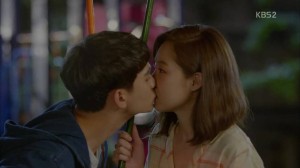 Ye-jin became my favorite female character because she showed that women could be nice, but still flawed. Too many dramas have a self-sacrificing perfect heroine whose biggest “flaw” is a certain quirkiness or “unfeminine” toughness. Female characters in dramas rarely have flaws that they have to reflect on, let alone grow from. The result is one-dimensional, and frankly not human, characters. Ye-jin was wonderfully complicated, and the drama showed her flaws as well as her positive traits. While not as cold as CEO Byun, Ye-jin also developed a tough exterior. She admits that being one of the few female PDs made her feel like she needed to be tough. She learned to never let her guard down and overcompensated because of her lack of confidence. While this helped her career-wise, her constant attempts to look powerful isolated her from others. At the end of the series, she finds more of a balance. She knows when to bring out her aggressiveness and when to take a step back to let others into her heart.
Ye-jin became my favorite female character because she showed that women could be nice, but still flawed. Too many dramas have a self-sacrificing perfect heroine whose biggest “flaw” is a certain quirkiness or “unfeminine” toughness. Female characters in dramas rarely have flaws that they have to reflect on, let alone grow from. The result is one-dimensional, and frankly not human, characters. Ye-jin was wonderfully complicated, and the drama showed her flaws as well as her positive traits. While not as cold as CEO Byun, Ye-jin also developed a tough exterior. She admits that being one of the few female PDs made her feel like she needed to be tough. She learned to never let her guard down and overcompensated because of her lack of confidence. While this helped her career-wise, her constant attempts to look powerful isolated her from others. At the end of the series, she finds more of a balance. She knows when to bring out her aggressiveness and when to take a step back to let others into her heart.
Even though Ye-jin had some flaws to work out, the series does not treat her as the damsel in distress. Joon-mo looks out for her by killing mosquitoes and complaining until her neighborhood lights are fixed. And in turn Ye-jin protects Joon-mo’s show and his feelings by clearing Cindy’s name. The drama shows that it’s not about men and women switching roles of hero and victim. Instead, both men and women can be heroes and be vulnerable in different situations.
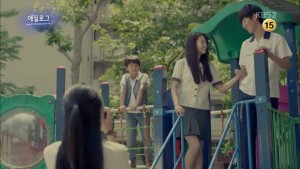 Ye-jin’s romantic choices are also treated with respect. In many dramas, there’s a clear love interest with a lot of duds in between, and even then that love interest can be physically or emotionally abusive. On top of that is the “fated lover” excuse where even the briefest meeting as children somehow means they are destined to be together. So even if there’s a good guy around, he’s not the one who “deserves” the female protagonist. These kinds of storylines take out the female character’s right to choose who is best for her. She’s forced to be with the guy who drags her around and harasses her because they played one game of hide-and-seek in elementary school.
Ye-jin’s romantic choices are also treated with respect. In many dramas, there’s a clear love interest with a lot of duds in between, and even then that love interest can be physically or emotionally abusive. On top of that is the “fated lover” excuse where even the briefest meeting as children somehow means they are destined to be together. So even if there’s a good guy around, he’s not the one who “deserves” the female protagonist. These kinds of storylines take out the female character’s right to choose who is best for her. She’s forced to be with the guy who drags her around and harasses her because they played one game of hide-and-seek in elementary school.
In The Producers, both Joon-mo and Seung-chan could be the “fated” lover because they knew her as children. Both are also nice, good-looking guys who get along well with her. There really isn’t a clear winner, and so the show doesn’t let us choose Ye-jin’s boyfriend for her. Instead, the show makes us actually listen to Ye-jin and what she really wants. We as the audience have to respect her decision. Respect plays a big role in romance in The Producers. When Seung-chan kisses Ye-jin, she doesn’t become a giddy schoolgirl who runs away; she spends that night trying to understand his feelings. She doesn’t keep her worries about Joon-mo to herself either. She voices her concerns about where their friendship is going and gives him a chance to think about it too.
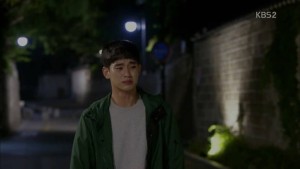 Seung-chan’s small acts of revenge were comical considering the skittish rookie he was in episode one. He sabotages people at times, such as not giving Hong-soon any mints for attempting to set Ye-jin up on a blind date. But that’s a far cry from dramas like Boys Over Flowers where Jun-pyo (Lee Min-ho, City Hunter) sends men to drug and then kidnap Jan-di (Gu Hye-sun, Angel Eyes). And let’s not forget Secret Garden where Joo-won (Hyun Bin, Hyde, Jekyll, and I) tricks Ra-im (Ha Ji-won, Empress Ki) into letting him in her room, shoves her on the bed, and then physically restrains her all while she says no. Seung-chan may be jealous, but his antics are more playful rather than creepy. He doesn’t punish Ye-jin for rejecting him. He doesn’t even mask his sadness with anger and use that as an excuse to assault her. So kudos to the writing team for creating a guy worth rooting for.
Seung-chan’s small acts of revenge were comical considering the skittish rookie he was in episode one. He sabotages people at times, such as not giving Hong-soon any mints for attempting to set Ye-jin up on a blind date. But that’s a far cry from dramas like Boys Over Flowers where Jun-pyo (Lee Min-ho, City Hunter) sends men to drug and then kidnap Jan-di (Gu Hye-sun, Angel Eyes). And let’s not forget Secret Garden where Joo-won (Hyun Bin, Hyde, Jekyll, and I) tricks Ra-im (Ha Ji-won, Empress Ki) into letting him in her room, shoves her on the bed, and then physically restrains her all while she says no. Seung-chan may be jealous, but his antics are more playful rather than creepy. He doesn’t punish Ye-jin for rejecting him. He doesn’t even mask his sadness with anger and use that as an excuse to assault her. So kudos to the writing team for creating a guy worth rooting for.
All in all, The Producers is a real gem of a series. It’s short for a drama, but that forced the writers to include only the most important scenes and really focus on the characters. Even though there was a surprise bonus episode added on afterwards, I’m crossing my fingers for a full-blown second season!
(Korea Herald, images via KBS)


